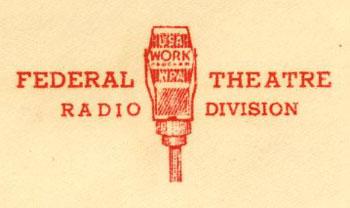
This episode is from the WNYC archives. It may contain language which is no longer politically or socially appropriate.
Re-enactment of the proposal, on January 5, 1938, to create a federal bureau of the arts based on the WPA.
Six panelists (3 for and 3 against) discuss this proposal and the merits of federally funded arts administration.
Stuart Davis, Goddard Lieberson, and Burgess Meredith discuss reasons to continue the program. Brinkerhoff, Jonas Lee, and Harvey Wiley Corbett give reasons against.
Davis: A limited private patronage is inadequate to establish the basis for an American artistic culture. Private patronage does not accept any responsibility for the artist, has no conception of the meaning of democracy and culture, specifically the participation of the masses, considers art a private affair. Establishment of various federal arts project gave the American artist his first real chance to develop. WPA was designed to give employment to unemployed artists; it established the beginning of an art movement unparalleled in history. Individual initiative characterizes the work done by the WPA. WPA work promises to be the most lasting and bring about the largest return. Democratic participation in art is now possible. Responds to accusations of propaganda. Without federal support, the artist will be unable to produce because private patronage has shrunken to the vanishing point. Emergency nature of WPA's patronage. The WPA artists have been hampered by the knowledge that their employment is precarious. Permanent necessity of art patronage. There are no universal high standards in art, so the establishment of federal support cannot destroy them. The bill establishes competence, not relief. Compares federal support for art to federal support for equal education.
Lieberson: Americans should accept some of the responsibility for elevating American culture. Federal Arts Project proved there exists in the US the potential for an artistic culture. It is not enough to have young people who aspire to artistic endeavors. The letters WPA are a bugaboo to those who are opposed to democratic progress in the arts. The WPA has decentralized the arts. The artist cannot exist without and audience. No artist resents a public for his own work.
Meredith: Meetings to compile suggestions for changes to the bill have not included the opposition because they refuse to participate. No artist is helped by an empty stomach. If we are to continue as a democracy, we have to judge things on their worth and not their source. Reads a letter from Elmer Benson, Governor of Minnesota.
Brinkerhoff: People have not analyzed the substance of the bill. An analysis shows an effort to organize artists in to groups and see them as part of the labor force, to give them work regardless of artistic ability. The activity provided for would be greater in cost than any undertaken so far. Those organizations which attract the greatest number of artists will present to the President one or more names, from which a commissioner be named. There is no requirement that these people be artists. An artist must belong to the organization with the most members in his field if he wants a job under the bureau. Otherwise he can have no part in the efforts of the bureau. The visual arts are more effective propaganda than any other medium.
Lee: Artists as a whole are not against the WPA's work. A permanent relief bureau would undermine the morale of the artist. Cultural aspects of life should receive promotion and encouragement from the Federal Government, but not in a way to regiment the artist, which would destroy the creative incentive. The artist must be free from dictation and political authority. These bills are an effort to affiliate artists with labor and give employment to the greatest number, regardless of artistic talent and quality. Something other than these particular bills is needed.
Corbett: The nature of government sponsorship of architecture should be clearly stated. Proper relief measures do have a place, but this one would be dominated by a majority vote, rather than by free competitive process.
[Poor quality original.]
Audio courtesy of the NYC Municipal Archives WNYC Collection
WNYC archives id: 8291
Municipal archives id: LT21
